Loia
On this page, you find all documents, package deals, and flashcards offered by seller LoIa.
- 155
- 0
- 0
Community
- Followers
- Following
3 Reviews received
155 items
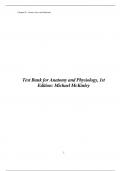
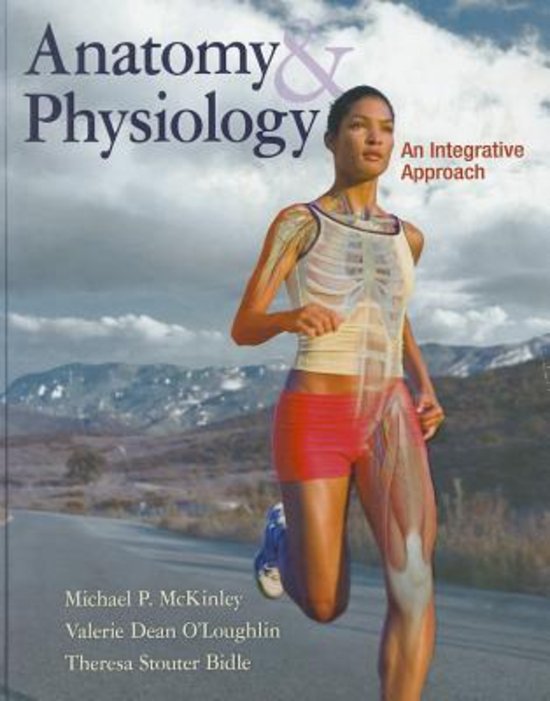
Test Bank for Anatomy and Physiology, 1st Edition: Michael McKinley
Chapter 02 - Atoms, Ions, and Molecules Chapter 02 Atoms, Ions, and Molecules Fill in the Blank Questions 1. Anything that has mass and occupies space is considered to be ________. matter Bloom's Level: 1. Remember HAPS Objective: C01.01a With respect to the structure of an atom: Describe the charge, mass, and relative location of electrons, protons and neutrons. HAPS Topic: Module C01 Atoms & molecules. Learning Objective: 02.01.01 Define matter, and list its three forms. Section: 0...
- Book
- Exam (elaborations)
- • 69 pages •
Chapter 02 - Atoms, Ions, and Molecules Chapter 02 Atoms, Ions, and Molecules Fill in the Blank Questions 1. Anything that has mass and occupies space is considered to be ________. matter Bloom's Level: 1. Remember HAPS Objective: C01.01a With respect to the structure of an atom: Describe the charge, mass, and relative location of electrons, protons and neutrons. HAPS Topic: Module C01 Atoms & molecules. Learning Objective: 02.01.01 Define matter, and list its three forms. Section: 0...
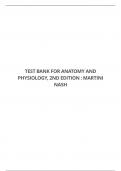
TEST BANK FOR ANATOMY AND PHYSIOLOGY, 2ND EDITION : MARTINI NASH
Exam Name___________________________________ MULTIPLE CHOICE. Choose the one alternative that best completes the statement or answers the question. 1) ________ is considered the oldest medical science. 1) A) Physiology B) Biology C) Cytology D) Embryology E) Anatomy 2) Anatomy is to ________ as physiology is to ________. 2) A) structure; form B) structure; function C) growth; form D) function; form E) form; structure 3) The analysis of the internal structure of individual cells is...
- Book
- Exam (elaborations)
- • 13 pages •
Exam Name___________________________________ MULTIPLE CHOICE. Choose the one alternative that best completes the statement or answers the question. 1) ________ is considered the oldest medical science. 1) A) Physiology B) Biology C) Cytology D) Embryology E) Anatomy 2) Anatomy is to ________ as physiology is to ________. 2) A) structure; form B) structure; function C) growth; form D) function; form E) form; structure 3) The analysis of the internal structure of individual cells is...
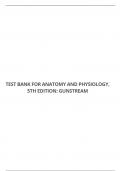
TEST BANK FOR ANATOMY AND PHYSIOLOGY, 5TH EDITION: GUNSTREAM
1 Student: 1. The term used to describe something pertaining to the internal organs is A. visceral. B. proximal. C. peripheral. D. deep. 2. The term peripheral refers to a structure that is A. toward the abdominal surface. B. away from the body surface. C. away from the center of the body. D. to the left of the midline. 3. The chin is to the mouth, and the knee is to the ankle. A. anterior; distal B. inferior; distal C. superior; proximal D. inferior; proximal 4. The integumenta...
- Book
- Exam (elaborations)
- • 14 pages •
1 Student: 1. The term used to describe something pertaining to the internal organs is A. visceral. B. proximal. C. peripheral. D. deep. 2. The term peripheral refers to a structure that is A. toward the abdominal surface. B. away from the body surface. C. away from the center of the body. D. to the left of the midline. 3. The chin is to the mouth, and the knee is to the ankle. A. anterior; distal B. inferior; distal C. superior; proximal D. inferior; proximal 4. The integumenta...
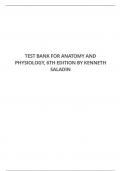
TEST BANK FOR ANATOMY AND PHYSIOLOGY, 6TH EDITION BY KENNETH SALADIN
chapter 01 True / False Questions 1. Feeling for swollen lymph nodes is an example of auscultation. True False 2. We can see through bones with magnetic resonance imaging (MRI). True False 3. Histology is the study of structures that can be observed without a magnifying lens. True False 4. Cells were first named by microscopist Robert Hooke. True False 5. All functions of the body can be interpreted as the effects of cellular activity. True False 6. The hypothetico-deductive met...
- Book
- Exam (elaborations)
- • 22 pages •
chapter 01 True / False Questions 1. Feeling for swollen lymph nodes is an example of auscultation. True False 2. We can see through bones with magnetic resonance imaging (MRI). True False 3. Histology is the study of structures that can be observed without a magnifying lens. True False 4. Cells were first named by microscopist Robert Hooke. True False 5. All functions of the body can be interpreted as the effects of cellular activity. True False 6. The hypothetico-deductive met...
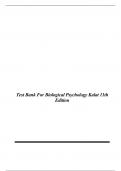
Test Bank For Biological Psychology Kalat 11th Edition
Chapter 1: The Major Issues TRUE/FALSE 1. Neuroscientists are more interested in studying behavior than biological psychologists. ANS: F PTS: 1 DIF: factual REF: Introduction OBJ: 1 TOP: 1.1 The Biological Approach to Behavior 2. According to Tinbergen, a physiological explanation describes why a structure or behavior evolved as it did. ANS: F PTS: 1 DIF: factual REF: Introduction OBJ: 1 TOP: 1.1 The Biological Approach to Behavior 3. An evolutionary explanation describes why a structur...
- Book
- Exam (elaborations)
- • 39 pages •
Chapter 1: The Major Issues TRUE/FALSE 1. Neuroscientists are more interested in studying behavior than biological psychologists. ANS: F PTS: 1 DIF: factual REF: Introduction OBJ: 1 TOP: 1.1 The Biological Approach to Behavior 2. According to Tinbergen, a physiological explanation describes why a structure or behavior evolved as it did. ANS: F PTS: 1 DIF: factual REF: Introduction OBJ: 1 TOP: 1.1 The Biological Approach to Behavior 3. An evolutionary explanation describes why a structur...

TEST BANK FOR BIOPSYCHOLOGY BY PINEL 8TH EDITION
Chapter 1: Biopsychology as a Neuroscience CHAPTER 1 BIOPSYCHOLOGY AS A NEUROSCIENCE: WHAT IS BIOPSYCHOLOGY, ANYWAY? MULTIPLE CHOICE QUESTIONS 1) The human brain weighs about A) 0.3 kilograms (0.7 pounds). B) 0.8 kilograms (1.8 pounds). C) 1.0 kilograms (2.2 pounds). D) 1.3 kilograms (2.9 pounds). E) 2.3 kilograms (5.1 pounds). Answer: D Diff: 2 Page Ref: 2 Topic: Chapter 1 Introduction 2) The human brain is composed of various cells, including about 100 billion that are specialized...
- Book
- Exam (elaborations)
- • 18 pages •
Chapter 1: Biopsychology as a Neuroscience CHAPTER 1 BIOPSYCHOLOGY AS A NEUROSCIENCE: WHAT IS BIOPSYCHOLOGY, ANYWAY? MULTIPLE CHOICE QUESTIONS 1) The human brain weighs about A) 0.3 kilograms (0.7 pounds). B) 0.8 kilograms (1.8 pounds). C) 1.0 kilograms (2.2 pounds). D) 1.3 kilograms (2.9 pounds). E) 2.3 kilograms (5.1 pounds). Answer: D Diff: 2 Page Ref: 2 Topic: Chapter 1 Introduction 2) The human brain is composed of various cells, including about 100 billion that are specialized...

TEST BANK FOR BODY STRUCTURES AND FUNCTIONS, 12TH EDITION : SCOTT
1 Chapter 1: Introduction to the Structural Units TRUE/FALSE 1. The pelvic cavity contains the organs of the reproductive and excretory system. ANS: T PTS: 1 2. The thoracic cavity protects the heart and lungs. ANS: T PTS: 1 3. The lungs are located inferior to the diaphragm. ANS: F Inferior refers to below and the lungs are above, or superior, to the diaphragm. PTS: 1 4. The kidneys are located within the abdominal cavity. ANS: F The kidneys are located behind the abdominal cavity;...
- Book
- Exam (elaborations)
- • 10 pages •
1 Chapter 1: Introduction to the Structural Units TRUE/FALSE 1. The pelvic cavity contains the organs of the reproductive and excretory system. ANS: T PTS: 1 2. The thoracic cavity protects the heart and lungs. ANS: T PTS: 1 3. The lungs are located inferior to the diaphragm. ANS: F Inferior refers to below and the lungs are above, or superior, to the diaphragm. PTS: 1 4. The kidneys are located within the abdominal cavity. ANS: F The kidneys are located behind the abdominal cavity;...
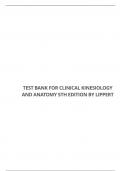
TEST BANK FOR CLINICAL KINESIOLOGY AND ANATOMY 5TH EDITION BY LIPPERT
Chapter 1: Basic Information Multiple Choice Identify the choice that best completes the statement or answers the question. ____ 1. The fibula is on which side of the lower leg? a. Medial c. Proximal b. Lateral d. Distal ____ 2. The ulna is where in relation to the humerus? a. Medial c. Proximal b. Lateral d. Distal ____ 3. In anatomical position, the thumb is located where in relation to the fingers? a. Medial c. Proximal b. Lateral d. Distal ____ 4. In moving from anatomical positi...
- Book
- Exam (elaborations)
- • 3 pages •
Chapter 1: Basic Information Multiple Choice Identify the choice that best completes the statement or answers the question. ____ 1. The fibula is on which side of the lower leg? a. Medial c. Proximal b. Lateral d. Distal ____ 2. The ulna is where in relation to the humerus? a. Medial c. Proximal b. Lateral d. Distal ____ 3. In anatomical position, the thumb is located where in relation to the fingers? a. Medial c. Proximal b. Lateral d. Distal ____ 4. In moving from anatomical positi...
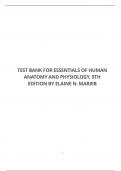
TEST BANK FOR ESSENTIALS OF HUMAN ANATOMY AND PHYSIOLOGY, 9TH EDITION BY ELAINE N. MARIEB
2 Essentials of Anatomy and Physiology, 9e (Marieb) Chapter 1 The Human Body: An Orientation Short Answer Figure 1.1 Using Figure 1.1, identify the following: 1) Label A points to the __________ cavity. Answer: cranial Diff: 1 Page Ref: 20 2) Label B points to the __________ cavity. Answer: spinal Diff: 1 Page Ref: 20 3) Label C points to the __________ cavity. Answer: thoracic Diff: 1 Page Ref: 20 4) Label D points to the __________. Answer: diaphragm Diff: 1 Page Ref: 20 5) L...
- Book
- Exam (elaborations)
- • 20 pages •
2 Essentials of Anatomy and Physiology, 9e (Marieb) Chapter 1 The Human Body: An Orientation Short Answer Figure 1.1 Using Figure 1.1, identify the following: 1) Label A points to the __________ cavity. Answer: cranial Diff: 1 Page Ref: 20 2) Label B points to the __________ cavity. Answer: spinal Diff: 1 Page Ref: 20 3) Label C points to the __________ cavity. Answer: thoracic Diff: 1 Page Ref: 20 4) Label D points to the __________. Answer: diaphragm Diff: 1 Page Ref: 20 5) L...
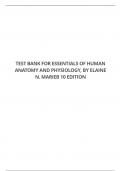
TEST BANK FOR ESSENTIALS OF HUMAN ANATOMY AND PHYSIOLOGY, 10 EDITION BY ELAINE N. MARIEB
Figure 2.1 Using Figure 2.1, match the following: 1) Lipid. Answer: D 2) Functional protein. Answer: B 3) Nucleotide. Answer: E 4) Polysaccharide. Answer: C 5) Monosaccharide. Answer: A 6) Polymer. Answer: C 7) Tertiary (protein) structure. Answer: B Figure 2.2 Using Figure 2.2, match the following: 8) Deoxyribose sugar. Answer: B 9) Thymine. Answer: D 10) Guanine. Answer: E 11) Phosphate. Answer: C 12) Hydrogen bonds. Answer: A
- Book
- Exam (elaborations)
- • 17 pages •
Figure 2.1 Using Figure 2.1, match the following: 1) Lipid. Answer: D 2) Functional protein. Answer: B 3) Nucleotide. Answer: E 4) Polysaccharide. Answer: C 5) Monosaccharide. Answer: A 6) Polymer. Answer: C 7) Tertiary (protein) structure. Answer: B Figure 2.2 Using Figure 2.2, match the following: 8) Deoxyribose sugar. Answer: B 9) Thymine. Answer: D 10) Guanine. Answer: E 11) Phosphate. Answer: C 12) Hydrogen bonds. Answer: A

TEST BANK FOR LEHNINGER PRINCIPLES OF BIOCHEMISTRY 6TH EDITION BY NELSON
TEST BANK FOR PRINCIPLES OF LIFE, 1ST EDITION: DAVID M. HILLIS
TEST BANK FOR VANDER’S HUMAN PHYSIOLOGY, 13TH EDITION – ERIC WIDMAIER